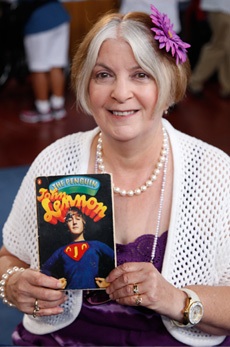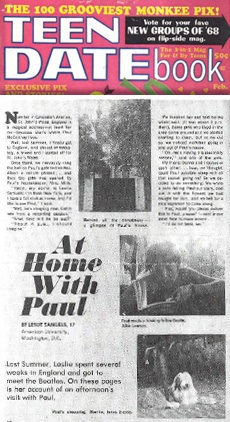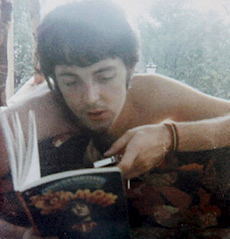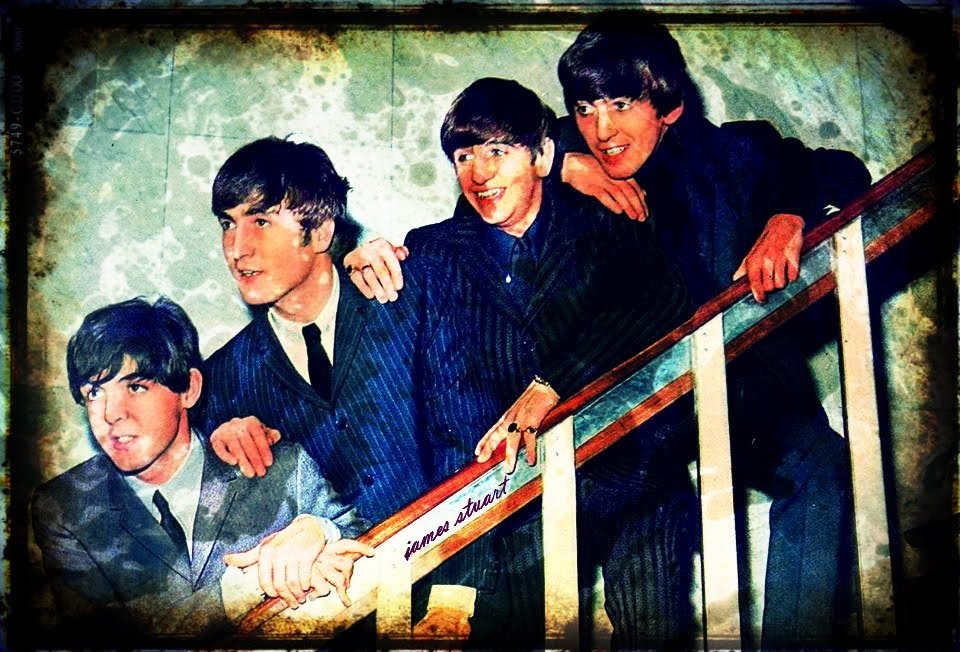A Corpus Christi guest relives her experiences as a diehard Beatles fan in late-60s London, and shares a never-before-heard recording she made of Paul McCartney!
 For those of us who weren't alive during Beatlemania, it takes an effort of the imagination to grasp how unbearably exciting it all must have been.
For those of us who weren't alive during Beatlemania, it takes an effort of the imagination to grasp how unbearably exciting it all must have been. To say that The Beatles were commercial and artistic conquerors of a kind unprecedented in human history sounds hyperbolic, but who else compares?
Prior to the middle of the 20th century, it was technologically impossible to be world-famous; the phenomenon of fame itself was fairly new. Elvis paved the way in that regard, but it's tough to make the case that his artistry approached that of the Beatles.
In 1967, with the Beatles in the most productive period of their career, Leslie Healy, now of San Angelo, Texas, visited John Lennon and Paul McCartney in their homes, securing Lennon's signature in his just-released collection of poetry,
The Penguin John Lennon, as well as a tape recording, never publicly released, of McCartney reading one of Lennon's poems. Thanks to the autograph's watertight provenance, Laura Woolley, of Los Angeles' Collector's Lab, estimates the book would bring in between $3,000 and $5,000 at auction.
As a doctor's daughter growing up in the 1950s, Leslie was accustomed to what she calls a "black and white" world. With a few exceptions, most of the music that was popular was performed by adults, for adults. Frank Sinatra, who'd become popular in the years following World War II, was enjoying a resurgence, and dismissed rock-and-roll as a degraded music that was "sung, played, and written for the most part by cretinous goons."
When John Kennedy was elected in 1960, Leslie says, the mood brightened somewhat.
"We had our young president," she says, "but then he was killed. Everything was gloomy. But all of a sudden, with the Beatles, you had this music, and it was young, and it was fun, and it was something we could follow and look up to. It changed the way we felt. They were English, but they were in the right place at the right time for our country."
 The "rumbling," as Leslie puts it, started at the end of 1963. When the Beatles made their epochal appearance on the Ed Sullivan show in February of 1964, Leslie benefited from a bit of good luck. One of her father's patients was an executive at CBS, and he made sure Leslie had a ticket to the show.
The "rumbling," as Leslie puts it, started at the end of 1963. When the Beatles made their epochal appearance on the Ed Sullivan show in February of 1964, Leslie benefited from a bit of good luck. One of her father's patients was an executive at CBS, and he made sure Leslie had a ticket to the show. After that, Leslie made up her mind: She'd graduate high school and then, somehow, she would go to England to meet the Beatles. It helped the band's success that they were cute and clever, but for so many fans, Leslie included, their magnetism was stranger and more intensely personal than something as ordinary as sex appeal.
"I was so young and innocent at the time," she says, "so there was nothing sexual about it at all. I wanted to play guitar with them, make music with them. Does that sound crazy?"
First she had to finish high school. To bide her time and make the necessary contacts, Leslie organized a Beatles fan-club chapter, stuffing envelopes and generally acting as an unpaid employee forBrian Epstein's management team.
In 1967, a month before Leslie planned to leave for England, critics were wondering if the Beatles had finally run out of inspiration. Then they released Sgt. Pepper's Lonely Hearts Club Band. One of the album's most important cuts, "She's Leaving Home," resonated powerfully with Leslie's plans.
Leslie arrived at McCartney's house that summer with a bag of gifts from fan-club members -- sketches, poems, trinkets, love letters, and a bouquet of flowers. There was a crowd of girls outside the gate; no one was going in or out except a team of electricians doing repair work. Leslie attached a note to her flowers: Hi, Paul, I'm president of your New York fan club and I brought gifts. minutes later, the door opened. Which one of you is Leslie?
"I was in his yard for over an hour," she says, "and I brought a heavy reel-to-reel tape recorder. He was fine with it! I asked loads of questions, interviewing him, and as I was going through my stuff I had this book of John's. And he picked it up and started reading from it."

In 1967, Lennon was in his most obscure phase as a lyricist, having grown bored with the straightforward puppy-love lyrics of the Beatles' early records, and moved beyond even the introspection of "Help" and "Nowhere Man." In his abandoning the idea of meaning altogether, Lennon wrote what may be regarded as his most profound group of songs ("A Day in the Life," "I Am the Walrus.")
The poem that Paul read that day, "On This Churly Morn," [ Listen now ] shows Lennon working in the same nonsensical vein, being guided along not by meaning, but by sound, thought-association and even typing mistakes. Though "On This Churly Morn" is not a great poem, its rhythms nonetheless insinuate themselves into the mind.
Perhaps its greatest value is that it opens a window onto the artistic process that would power one of our greatest songwriter's greatest works.
After recording McCartney's impromptu reading Leslie took the number 73 bus to the London suburb of Weybridge to meet the Beatles' other front man, the poet himself.
"Everybody said he could be a bit cold, and could be cruel," says Leslie, "but he was amazing. He was warm and nice. I'd seen in the paper that he'd just taken delivery of his psychedelic-painted Rolls Royce. He said, 'You can go sit in it, if you like.' This was like a dream -- but it happened."
Before leaving, Leslie asked Lennon to sign her copy of The Penguin John Lennon, which collected two previous editions of his offbeat, Lewis Carroll-inspired poetry. In the Beatles' 1964 Christmas record, Lennon said of the collection, "It'll be the usual rubbish, but it won't cost much, you see." It's a fair assessment of the poetry's tossed-off quality. Still, it was from John Lennon, Leslie says, "so it was wonderful."
Leslie would remain in England into her 30s, and was in the Beatles' outer circle for years. She became a friend particularly of George Harrison, and is preparing to write a book about her experiences. Until then, she has plenty of Beatles memorabilia to sustain her recollections of being a "Beatle Tripper," including her autographed copy of The Penguin John Lennon.
"My dream," she says, "is to thank Sir Paul face to face for his music, the music of my life. He's changed the world and made it a better place. That would make me feel so ... so ... it would complete the circle. Before we all get too old.
Audio Transcript:
Leslie: Would you like to read something for us?
Paul McCartney: Read something, yes. ...
'To them perhaps be nicky
I smirk but querry jump
With all this alfy hicky
I do but strive a hump
Knock down ye smallish hooky
Am I the bairly oat?
With all your davey cockey
I'll always keep afloat.'
... Godspeed ...
Thank you. ... On this Churly Morn.
SOURCE: PBS Antiques Road Show
TRADUCCIÓN REGULAR
Los "Beatles Tripper"
Un invitado Corpus Christi revive sus experiencias como un fanático de los Beatles en Londres a finales de los años 60, y comparte una grabación nunca antes escuchada hizo de Paul McCartney!
Para aquellos de nosotros que no estuviera vivo durante la Beatlemanía, se necesita un esfuerzo de imaginación para comprender cómo insoportablemente excitante que todo debe haber sido.
Decir que The Beatles eran conquistadores comerciales y artísticos de un tipo sin precedentes en la historia humana suena hiperbólico, pero compara quién más? Antes de mediados del siglo 20, era tecnológicamente imposible ser mundialmente famoso, el fenómeno de la fama en sí era bastante nuevo. Elvis abrió el camino en ese sentido, pero es difícil argumentar que su arte se acercó a la de los Beatles.
En 1967, con los Beatles en el período más productivo de su carrera, Leslie Healy, ahora de San Angelo, Texas, visitó a John Lennon y Paul McCartney en sus hogares, asegurando la firma de Lennon en su colección recién publicado de poesía, The John pingüino Lennon, así como una cinta de grabación, nunca hizo público, McCartney de la lectura de uno de los poemas de Lennon. Gracias a la procedencia de autógrafos de estanquidad, Laura Woolley, del Laboratorio de Los Angeles Collector ', estima el libro traería entre $ 3.000 y $ 5.000 en una subasta.
Como hija de un médico de crecer en la década de 1950, Leslie estaba acostumbrado a lo que ella llama un "blanco y negro" del mundo. Con pocas excepciones, la mayor parte de la música que era popular se llevó a cabo por los adultos, para los adultos.
Frank Sinatra, que había llegado a ser popular en los años posteriores a la Segunda Guerra Mundial, estaba disfrutando de un resurgimiento, y desestimó rock-and-roll como música degradada que estaba "cantado, jugado, y escrito en su mayor parte por los matones de cretinos". Cuando John Kennedy fue elegido en 1960, Leslie dice, el estado de ánimo se iluminó un poco.
"Tuvimos nuestro joven presidente", dice ella, "pero luego lo mataron. Todo era sombrío. Pero de repente, con los Beatles, que tenía esta música, y era joven, y fue muy divertido, y fue algo que podríamos seguir y admirar. Cambió la manera en que nos sentimos. Eran Inglés, pero estaban en el lugar correcto en el momento correcto para nuestro país ".
El "ruido", como Leslie dice, comenzó a finales de 1963. Cuando los Beatles hicieron su aparición trascendental en el show de Ed Sullivan en febrero de 1964, Leslie beneficiado de un poco de buena suerte. Uno de los pacientes de su padre era un ejecutivo de CBS, y se aseguró Leslie tenía un boleto para el show.
Después de eso, Leslie tomó una decisión: Había graduarse de la escuela secundaria y luego, de alguna manera, ella iría a Inglaterra para cumplir con los Beatles. Ayudó éxito de la banda que estaban lindo e inteligente, pero para muchos fans, Leslie incluido, su magnetismo era forastero, y más intensamente personal que algo tan común como el atractivo sexual.
"Yo era tan joven e inocente a la vez", dice, "así que no había nada sexual en ello. Yo quería tocar la guitarra con ellos, hacer música con ellos. ¿Suena loco?"
Primero tuvo que terminar la escuela secundaria. Para bide su tiempo y hacer los contactos necesarios, Leslie organizó un club de fans Beatles capítulo, rellenando sobres y en general actúa como un empleado no remunerado para el equipo de gestión de Brian Epstein.
En 1967, un mes antes de Leslie planeado salir para Inglaterra, los críticos se preguntan si los Beatles se había quedado finalmente fuera de la inspiración. Luego lanzaron el sargento. Peppers Lonely Hearts Club Band. Uno de los recortes más importantes del álbum, "Ella Leaving Home", resonaba poderosamente con los planes de Leslie.
Leslie llegó a la casa de McCartney que el verano con una bolsa de regalos de los miembros del club de ventilador - dibujos, poemas, baratijas, cartas de amor, y un ramo de flores.
Había un grupo de niñas fuera de la puerta, nadie iba dentro o fuera excepto un equipo de electricistas que realizan trabajos de reparación. Leslie adjunta una nota a sus flores: Hola Pablo, yo soy el presidente de su club de Nueva York fan y me trajo regalos. minutos después, la puerta se abrió. ¿Cuál de ustedes es Leslie?
"Yo estaba en el patio durante más de una hora," dice, "y me trajo un pesado carrete a carrete grabadora. Estaba bien con él! Le pregunté un montón de preguntas, entrevistar a él, y como yo estaba pasando por mis cosas tuve este libro de Juan. Y él lo tomó y empezó a leer de él. "
En 1967, Lennon se encontraba en su fase más oscura como letrista, después de haber crecido aburrido con los sencillos Puppy Love letras-de los registros de los Beatles iniciales, y se movió más allá incluso de la introspección de "Ayuda" y "Nowhere Man".
En su abandono de la idea de sentido por completo, Lennon escribió lo que puede considerarse como su grupo más profundo de las canciones ("A Day in the Life", "I Am the Walrus".)
El poema que Pablo leyó ese día ", en la Historia Churly Morn, "[Escuchar ahora] muestra Lennon trabajando en el mismo sentido sin sentido, guiándose no a lo largo de significado, sino por el sonido, pensamiento y asociación errores, incluso tipográficos. Aunque "en esta mañana Churly" no es un gran poema, sus ritmos, sin embargo se insinúan en la mente. Quizás su mayor valor es que abre una ventana al proceso artístico que accionaría una de las mayores obras de nuestro gran compositor.
Después de grabar Leslie improvisado McCartney tomó la lectura autobús número 73 hasta el suburbio londinense de Weybridge al encuentro del hombre de los Beatles otro frente, el propio poeta.
"Todo el mundo dice que puede ser un poco frío, y podía ser cruel", dice Leslie, "pero él fue increíble. Él era cálido y agradable. Había visto en el periódico que acababa hecho cargo de su psicodélico pintado Rolls Royce. Él dijo: "Usted puede ir a sentarse en el mismo, si quieres. Esto fue como un sueño - pero sucedió ".
Antes de irse, preguntó Leslie Lennon a firmar su ejemplar de El Pingüino John Lennon, que recogió dos ediciones anteriores de su poco convencional, Lewis Carroll inspirado en la poesía. En 1964 los Beatles record Navidad, Lennon dijo de la colección, "Va a ser la basura de costumbre, pero no va a costar mucho, ya ves." Es una valoración correcta de la sacudida-off de la calidad de la poesía. Sin embargo, era de John Lennon, Leslie dice, "así que fue maravilloso."
Leslie se quedaría en Inglaterra en unos 30 años, y estaba en el círculo de los Beatles exterior durante años. Ella se convirtió en un amigo especial de George Harrison, y se prepara para escribir un libro sobre sus experiencias. Hasta entonces, ella tiene un montón de objetos de los Beatles para mantener sus recuerdos de ser un "Beatle Tripper", incluyendo su copia autografiada de El Pingüino John Lennon.
"Mi sueño", dice ella, "es dar las gracias a Sir Paul cara a cara por su música, la música de mi vida. Ha cambiado el mundo y la convirtió en un lugar mejor. Eso me haría sentir tan ... tan .. . completaría el círculo. Antes de que todos seamos demasiado viejos.
Transcripción de Audio:
Leslie: ¿Te gustaría leer algo para nosotros?
Paul McCartney: lee algo, sí. ...
"Para ellos tal vez sea nicky
Sonrío pero salto Querry
Con todo esto Hicky alfy
No hago más que esforzarse por una joroba
Derriba novillos pequeña ye
¿Soy la avena bairly?
Con todo su Cockey davey
Siempre voy a mantener a flote ".
... Godspeed ...
Gracias. ... En esta Morn Churly.
FUENTE:
PBS Antiques Road Show

No hay comentarios:
Publicar un comentario